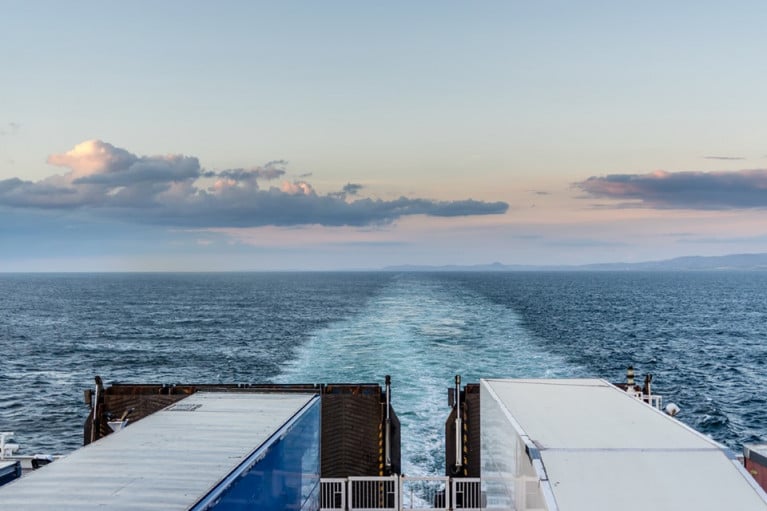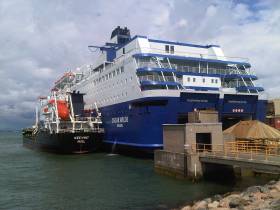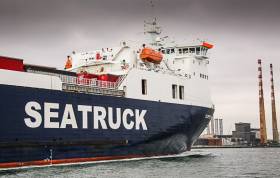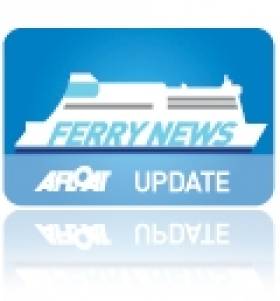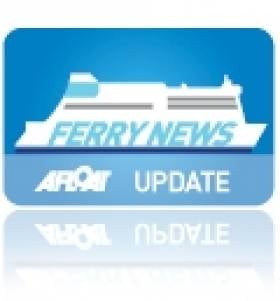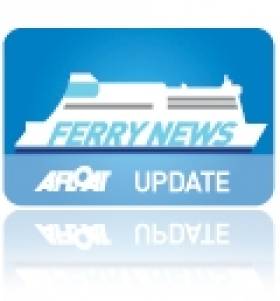Displaying items by tag: Freight
Mayo county councillors have called for a formal letter demanding that Dublin Port Company reverse its decision to end the regular rail freight service to Ballina, as The Western People reports.
At a meeting of Ballina Municipal District this morning (Wednesday 16 June), local councillors expressed their dismay at the sudden cessation of the seven-times weekly service from Dublin last Thursday.
One councillor branded the move as a “thump in the face for north Mayo”, suggesting that protests akin to those highlighting the mica crisis in the North West could be in the offing, while another said port management should be pressed to find a solution to the congestion issues cited in the decision.
The Western People has much more on the story HERE.
Bars and Restaurants on Ferries Should Be Shut & Put Passengers in Individual Cabins - Hauliers
A call from Irish hauliers to ferry operators to shut all bars and restaurants at sea and to provide room service to individual drivers in their own cabins to keep them shielded from Covid-19, reported Independent.ie
The Freight Transport Association of Ireland (FTAI) issued its appeal as Brittany Ferries which Afloat also reported on Monday, became the first operator to suspend some of its sea links with the island.
FTAI general manager Aidan Flynn said truck drivers were critical for ensuring that agri-food and other essential supplies travel uninterrupted between Ireland, Britain and Europe.
Mr Flynn said ferry firms should “prioritise the safety and welfare of commercial drivers during the Covid-19 pandemic. Their safety should take precedence to ensure our supply chain is protected at all costs.”
The association wants ferries to provide all passengers - but particularly lorry drivers - their own individual cabins and to deliver meals and drinks directly to those cabins. It says all bars and restaurants should be shut to reduce potential virus transmission.
For more on this story which refers to other ferry operators, click here and whenever the newspaper (homepage) has more and in addition to their 'Travel News' here.
Afloat has listed the ferry operators websites below with an important range of travel advice and information with FAQ relating to Covid-19.
Irish Ferries and for sailing updates by clicking here
Stena Line and for sailing updates click here
Brittany Ferries for sailing updates here
It is strongly advised to consult these operators frequently for updates.
In addition to consulting the Irish Department of Foreign Affairs and Trade (DFA) website HERE for the latest advice on travelling overseas and from the UK Foreign and Commonwealth Office (FCO) HERE (re: Ireland) and also HERE.
According to today's TheJournal.ie as of midnight tonight, Ryanair flight schedules will be cut by over 80%. The airline says that almost all of its flights (“if not all”) will be grounded next week, from midnight of Tuesday, 24 March.
#ferry - Minister for Transport has been accused of not doing enough to get a replacement for the Irish Ferries service linking Rosslare with Cherbourg.
The company according to the Irish Examiner, announced just before Christmas that it was unlikely to operate the route in 2019.
Verona Murphy from the Irish Road Hauliers Association says the response so far from Minister Shane Ross has been poor.
"Shane Ross should be actively looking for somebody to come into Rosslare and usurp the route that will provide what's needed for the exports of Ireland, to keep that foreign-direct investment that we've garnered and keep Irish people in jobs so that the economy will not suffer worse," she said.
"That route is primary. It's our shortest distance to mainland Europe."
Afloat adds the newspaper's photo is of the Normandy, which was replaced by Oscar Wilde in 2007.
Dublin Port Trade Volumes up 4.2% in First Nine Months of 2017
Dublin Port Company has published its latest trade figures showing growth of 4.2% to the end of Q3 2017. Overall, volumes in Dublin Port have grown by 30.1% in just five years.
A continuation in the current pace of growth would mean a third successive record year for Dublin Port.
Summary of YTD September 2017 Trade Statistics
|
Gross tonnes |
Q3 2017 |
Q3 2016 |
% change |
|
Imports |
16.0m |
15.4m |
3.5% |
|
Exports |
11.2m |
10.6m |
5.2% |
|
Total Throughput |
27.1m |
26.0m |
4.2% |
|
Ro-Ro units |
736,462 |
699,361 |
5.3% |
|
Lo-Lo TEU |
515,718 |
495,511 |
4.1% |
|
Ferry passengers |
1,496,025 |
1,460,585 |
2.4% |
|
Tourist vehicles |
411,921 |
400,949 |
2.7% |
|
Cruise ships |
127 |
103 |
23.3% |
|
Trade vehicles |
73,252 |
77,494 |
-5.5% |
Total throughput (imports and exports) for the nine months to the end of September was 27.1 million gross tonnes, with 5,932 ship arrivals during the period.
Consecutive Growth over the past five years
This is the fifth year in a row for Dublin Port to see substantial growth in the first nine months.
|
Trade Period |
% growth |
|
Q3 2013 |
3.1% |
|
Q3 2014 |
7.2% |
|
Q3 2015 |
5.8% |
|
Q3 2016 |
6.8% |
|
Q3 2017 |
4.2% |
New Ro-Ro Service
Growth was particularly strong in Ro-Ro freight with 736,462 units in the first nine months, an increase of 5.3% on the previous year. Within this total, Ro-Ro services between Ireland and Britain grew strongly at 6.2%. Elsewhere, Lo-Lo containers grew by 4.1% to 515,718 TEU.
As Afloat.ie previously reported, In a new development, Dublin Port Company has confirmed that it will welcome the maiden call of CLdN’s mv Celine at the end of October. Her arrival will provide additional capacity and flexibility for customers trading with markets in Continental Europe, particularly post BREXIT.
Celine will operate between Dublin Port and the ports of Zeebrugge and Rotterdam. With a capacity of 8,000 lane-metres, Celine can carry over 600 freight units and is approaching twice the size of the largest ferry currently operating from Dublin Port.
The volume of new imported trade vehicles through Dublin Port declined by -5.5% during the period, reflecting the large increase in recent times of second-hand vehicle imports from the UK.
Ferry & Cruise Tourism Growth
Tourism volumes on ferries grew strongly in the first nine months, with passenger numbers ahead by 2.4% to 1.5 million. Cruise tourism is also growing in Dublin with 127 cruise ships calling in the first nine months of what is already a record year for Dublin Port.
Eamonn O’Reilly, Chief Executive, Dublin Port Company, said: “Dublin Port’s volumes continue to grow strongly. It is clear that the trend of year on year increases that we saw in the decades before the crash of 2008 has returned. We have now seen five years of consistent growth and each of the last three years has been a record year.
“Notwithstanding the uncertainty generated by BREXIT, Dublin Port has seen Ro-Ro freight volumes on routes to Britain grow by 6.2% over the first three quarters of 2017 with ferry passenger numbers growing by 2.4%.
“We are increasing the capacity of the port on the basis that growth will continue for many years to come. Work is continuing on our first major Masterplan project, the Alexandra Basin Redevelopment (ABR) Project.
“We are seeing increasing demand for direct freight services to Continental Europe. The introduction by CLdN of the 8,000 lane metre Celine will greatly increase the capacity on direct services to Continental Europe. BREXIT is creating a lot of uncertainty and the introduction of the new ship shows the shipping sector beginning to provide additional capacity to create more options for importers and exporters. We expect to see more new services to Continental Europe during 2018.
“Before year end, we will commence construction of a bridge over the Covanta and ESB cooling water outfall on the Poolbeg Peninsula now that the construction of the waste to energy plant is complete. This bridge will bring unused port lands on the Poolbeg Peninsula into use and allow us to increase the capacity of our berths on South Bank Quay. This is the first step towards the ultimate development of all Dublin Port lands on the Poolbeg Peninsula under our Masterplan 2012-2040.
“We welcome the recognition in the recently approved Planning Scheme for the Poolbeg West SDZ that port lands are for port uses. This follows on from the recognition in the draft National Planning Framework of the importance for the country of the continued addition of port capacity in Dublin.”
Fastnet Line Closes For Good
#FERRY NEWS - The Fastnet Line ferry service between Cork and Swansea is to close with the loss of 78 jobs.
As previously reported on Afloat.ie, the operator had been in examinership since last November, and a restructured business plan had been submitted with a view to resuming high-season service in April.
However, in a statement the owners of the Fastnet Line said they had been unable to raise the €1m-plus investment required and that the examinership had "failed".
All 78 jobs will be lost as the company is set to be placed in receivership or liquidation later today.
The Fastnet Line - which was worth around €30 million to Cork in tourist spending - made its maiden voyage from Swansea to Cork in 2010, and was the only direct passenger and freight link between Wales and the south coast of Ireland.
The Irish Times has more on the story HERE.
Bon Voyage to Stena Voyager
The Stena Voyager high-speed ferry will make its final crossing between Belfast and Stranraer in mid-November.
BBC News cites the high cost of running the service, as well as its limited freight capacity, as reasons for the mothballing of the Stena HSS (High Speed Service).
The world's biggest high-speed ferry was a revelation when it was launched in 1996. The catamaran could reach speeds of up to 40 knots powered by enormous gas turbine engines.
But the rising cost of oil prompted a reduction in the ferry's cruising speed to save costs, making room for competition from conventional ferry routes with larger freight capacities.
The Voyager's fate was sealed when Stena Line announced plans to move its Stranraer port to a new location that will shave 20 minutes off the crossing for the two new but standard ferries that will replace it.
As previously reported on Afloat.ie, the Stena HSS between Dun Laoghaire and Holyhead will also be suspended from later this month, though it is planned to resume service in 2012 for the summer season.
Celtic Link Ferries Look Forward to New Ferry
Celtic Link Ferries are to introduce a replacement ferry on their Rosslare-Cherbourg port route later this year, writes Jehan Ashmore.
The current ship serving the route to France is a modern 26,500 tonnes ro-pax ferry Norman Voyager which entered service for Celtic Link Ferries less than two years ago. The ferry (photo) has a service speed of 22.9 knots and takes 18-hours to travel on the direct route between Ireland and France.
A spokesperson for the company claimed that bookings for the thrice-weekly round-trip sailings for this season are faster in uptake compared to this time last year. The Norman Voyager can take 800-passengers and 200 vehicles and facilities include 110 cabins, bar, restaurant, lounges, cinema and a shop.
The charter of Norman Voyager ceases in October and this will see the introduction of the acquired vessel on the year-round operated service. A competition is to be run and open to the public so to establish a new name for the vessel.
The new vessel the Cartour Beta (photo) is slightly larger at 27,552 tonnes and will be able to offer facilities with a wider choice of bars, restaurents and play areas. She has a speed of 25 knots, an increased passenger capacity of nearly 1,000 passengers, 800 cars or 150 freight vehicles.
Cartour Beta in the meantime operates on an Italian ferry service run by Caronte and Tourist (C&T) on two routes between Salerno to Messina and Termini Imerese in Sicily.
Externally in appearance the vessels are very similar except that the Cartour Beta has a continues superstructure that extends to surround the funnel whereas on the Norman Voyager this area is occupied by an open upper vehicle deck.
In fact the replacement vessel is more alike to Stena Line Irish Sea Ferries Belfast-Birkenhead route-ship sisters Lagan Viking and Mersey Viking. Like the Norman Voyager all these vessels are derived from a popular series built by Visentini, an Italian shipyard in Donada near Venice.
Since Celtic Link Ferries took over the route from P&O Irish Sea in 2005, the company has kept to a keenly priced policy with competition from other operators on the continental routes that also run out of Rosslare Harbour and from Cork.
Rosslare Europort
Rosslare Europort
Rosslare-Europort is located on the south-eastern tip of Ireland, and is the closest point in the south of the country to the UK and continental Europe.
There are regular sailings to Fishguard (with Stena Line); to Pembroke, Cherbourg, and Roscoff (with Irish Ferries); to Cherbourg (with Celtic Link Ferries); and to Le Havre (with UECC).
Rosslare-Europort, being the closest point from the southern part of Ireland to the UK and the European Mainland, is a hub of all the major RORO Passenger and Freight services operating the southern Irish Sea and Continental routes.
Enquiries relating to timetables, rates, fares, etc. on existing services should be addressed directly to the relevant shipping line (contact information is available on their respective websites – see links below).
Ferry Reservations – Please visit our partner site, aferry.to, to find out about the route schedules and booking information.
Getting to/from Rosslare Harbour by Sea – There are regular services to Cherbourg, Fishguard, Le Havre, Pembroke, and Roscoff. Book a sailing here.
Getting to/from Rosslare Harbour by Rail – There is a railway station in the port itself, Rosslare-Europort station. There are services to Dublin, Waterford, Cork, Kerry, and Limerick. See Irish Rail's website for more information.
Getting to/from Rosslare Harbour by Bus – Bus Eireann provide good services at Rosslare, linking it with Dublin, Cork, Waterford, Wexford, and it is possible to get connecting buses from there to your final destination. For more information, see Bus Éireann's website.
Getting to/from Rosslare Harbour by Car – Rosslare Harbour is located on the N25 route, which runs across the south of the country, connecting Rosslare with Waterford and Cork. If travelling from Dublin, take the N11 south to Wexford, from where you can turn onto the N25 east to Rosslare Harbour. If hiring a car, check out our car hire guide.
Rosslare Harbour Accommodation – Please see our Rosslare Harbour Accommodation page.
More Information – Rosslare Europort is operated by Iarnród Éireann (Irish Rail), and more information can be found on their website.
Trade enquiries regarding port access, rates, etc. should be addressed to:
Rosslare Europort John P Lynch, General Manager Rosslare Europort, Iarnród Éireann, Terminal Building, Rosslare Europort, Co Wexford. Tel: +353 (0) 53 915 7970 , ax: +353 (0) 1 886 0511 , or email: [email protected]


























